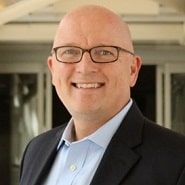
Robert Sundelius, COO, Ascension Michigan Medical Group
During the first wave of COVID-19 in the United States, I spent forty days quarantined in a small studio apartment on the outskirts of Detroit. As part of my role with a national health system, I was designated Deputy Incident Commander for our statewide market response. There was no path. No one had gone before. I remember the FaceTime calls with my wife and children, the tears, and the prayers covering it all. Our teams were brave, vulnerable, innovative, and relentless in their commitment to serve.
Though our healthcare presence spanned almost the entire state, Detroit was seemingly a city at the epicenter of the initial virus impact. The poor and underserved, those at the heart of our ministry mission, have suffered greatly. As of this writing, Michigan has 753,000 cases of COVID and has experienced 17,165 deaths; 17,165 first names. Names that reflect two elderly aunts of a co-worker, a young physician resident with a wife and two small children, a nurse with decades of service to those most in need; the list goes on.
We find ourselves in unprecedented times. On the cover of a not so long-ago Time Magazine are faces bruised, eyes filled with fatigue, offering windows into souls holding to hope and asking, “How long?” Our national psyche is also bruised. Our national soul is asking, “How long?” How long must we bear this pandemic? How long must we be divided? How long must we hold the weight of strife, injustice, false narrative, and blame? It seems much has fallen apart around us. Civility, honest discourse, justice, and, dare we say, promise.
We stand in the aftermath of what one year ago told us today would be. In our personal worlds, there are weddings and honeymoons canceled. Funerals are held without family. Jobs are lost and bank accounts emptied. In our professional worlds, there are strategic plans shredded, businesses gone, and unplanned transitions. And then beyond us, the political foundation of national unity fractured. Our way forward is now clouded and muted by the dust of everything that has fallen around us. And yet, facing forward, we still stand. One of my favorite authors, C.S. Lewis, writes:
“You can’t go back and change the beginning, but you can start where you are and change the ending.”
Finding a way forward, writing toward a better ending, is what we must do. In our personal lives, in our communities, in our teams and organizations, we must find a way forward. We must write new chapters and a better ending.
In this spirit, here are a few foundation stones that remain unbroken. Foundation stones, or principles, if you will, that must be preserved as we step forward with hope.
The endurance of beauty
We define beauty as a combination of qualities — such as sound, shape, color, or form — that please the aesthetic senses, the intellect, or moral sense. Simply, it refreshes the soul.
Sarah Fine, a senior lecturer in philosophy at Kings College in London, writes of beauty and art in the most difficult of situations (you can find it here). She highlights poignantly that Beethoven’s music features in Elie Wiesel’s Night (1958). At 15 years old, Wiesel was transported to Auschwitz. In a series of events described in his book, he was moved to the Gleiwitz camp. Upon arrival, Wiesel recognized the voice of Juliek, a Jewish violinist from Warsaw. Sarah writes, “That night, in a dark barrack… Wiesel heard Juliek playing part of a Beethoven concerto on his violin. ”Never before,” Wiesel explains, “had I heard such a beautiful sound.” Sarah Fine continues to emphasize the critical value of choosing these gifts to the soul.
“As we have seen, they matter to people, as sources of meaning and beauty, of hope and solace, escape and liberation. They matter to people as expressions of their humanity, tenacity, love, and defiance. What’s more, they’re valued in crisis, and they’re valued by people who have so much to teach us about what matters.”
Tested by the suffering of 2020, we are reminded of the value and power of beauty. We have seen it lived out at the bedside, in our neighborhoods, churches, synagogues, and businesses. As leaders, we must prioritize the telling and display of beauty in our organizations, systems, structures, and facilities. As individuals, we must give ourselves to finding and sharing beauty in our everyday lives: beautiful sound, beautiful art, beautiful action, and beautiful experience matter. They matter, especially in crisis and in healing from a crisis. Prioritizing this principle will bring value, offer gifts to our teams’ souls, and help us find firm footing for a way forward. Beauty is not a luxury; it is our truest identity.
This is a the first of a two-part blog series written by Robert Sundelius on the impact Covid-19 has had on the spirit of healthcare organizations, and what leaders can do to change the ending. As COO at Ascension Michigan Medical Group, Sundelius stood up and co-led the FEMA incident command structure for COVID-19 in one of the most heavily impacted areas of the country. To view the original post, click here.


Share Your Thoughts
You must be logged in to post a comment.